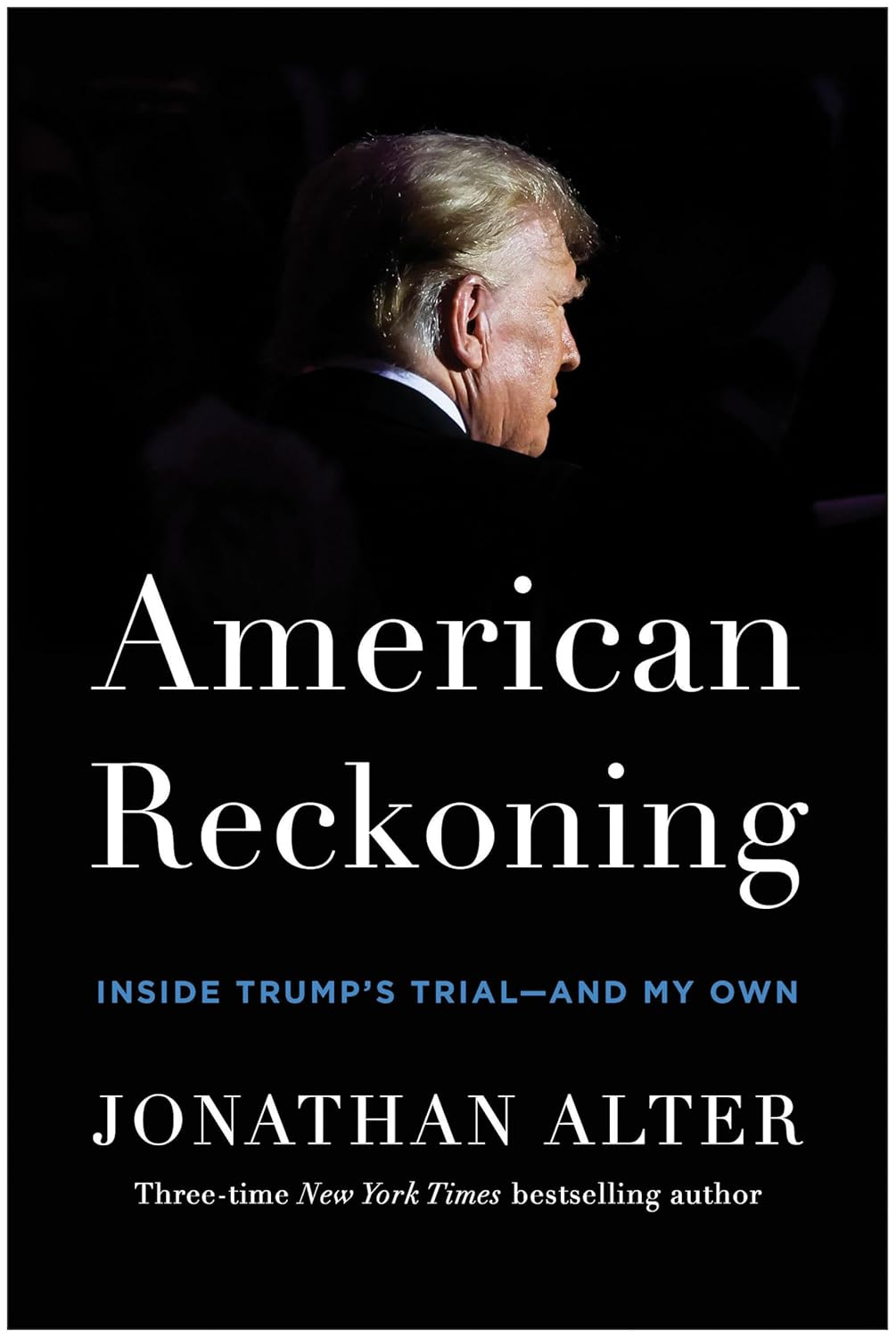No Furor Over the Fuhrer
Trump has this weird thing for Hitler. It is not exaggerated. Will we take note before it's too late?
If you had asked me a few months ago if my last column before November 5 would be about Donald Trump and Adolf Hitler, I would have said, “Nah.” Sure, Trump has long had a Hitler thing, but I figured he’d try to hide it when moving to the center in the general election.
But he didn’t, and I’m glad. If Trump loses, it will be because his vile character was on full display in the closing days of the campaign. Thank God.
I’ve always been a little suspicious of Hitler analogies of any kind. They signify simplistic historical analogizing and are frowned upon in journalism. I had a big problem with the posters of George W. Bush during the Iraq War swathed in swastikas and, later, of Barack Obama with a toothbrush mustache.
Hitler just seemed over the top. Watching Trump strutting on a stage or balcony with his arms folded, I’ve always been more taken with the Mussolini comparison, though Mussolini was much more intelligent and competent than Trump. To me, the best comparisons are to Trump’s modern-day role models: Xi Jinping, Vladimir Putin, Viktor Orban, Nicolas Maduro, Jair Bolsinaro, Rodrigo Duterte, and other strongmen who love money and power and use their authority to get more of both. Trump makes no secret of his respect for these thugs with blood on their hands. He’ll join their club if elected, trash NATO, sell-out Ukraine and the environment, and torpedo the domestic economy, as most of them have done.
But beyond his peer group, Trump has long had a soft spot for the Fuhrer. In 1990, Marie Brenner wrote an article in Vanity Fair about Trump’s divorce from Ivana, who told her lawyer that from time to time, her then-husband would read a collection of Hitler’s speeches, My New Order, that he kept in a cabinet by his bed.
Trump almost certainly didn’t read it; his aides have said for years that he doesn’t read anything except his press clips — not even intelligence briefings. But an interest in Nazis is lodged in his brain, and he didn’t discourage Hitler analogies as he closed in on the presidency. When Steve Bannon saw Trump descend the Trump Tower escalator, he thought, “That’s Hitler!” Bannon was ecstatic, he told New York Times correspondent Jeremy Peters. Others were less charmed by the demagogue. After the 2016 election, an author and venture capitalist named J.D. Vance wrote to a friend that Trump was “America’s Hitler.”
Vance no doubt noticed that Trump often plagiarizes Hitler, only with immigrants subbing for Jews. Trump dehumanizes immigrants by calling them “vermin” who are “poisoning the blood of our country”—Hitler’s exact words for the Jews. Over the years, he has echoed Hitler’s depiction of “the enemy within,” an insult long directed at the nonexistent threat of “Marxists,” a favorite Hitler target.
Then, on October 14, Trump expanded his threats. The “enemy from within,” he said, “should be very easily handled by, if necessary, by National Guard, or if necessary, by the military.” Six days later, he got specific about who should be targeted by the Guard or military: “Shifty” Schiff [soon to be California Senator Adam Schiff] and “the Pelosis, these people, they’re so sick, and they’re so evil.” It’s not enough that Paul Pelosi had his skull fractured by a Trump-loving intruder and was near death in the hospital when Trump joked about him. Now, Trump says he and his wife should be targeted by the military. Liz Cheney, too. The draft dodger who lied about opposing the Iraq War said Cheney should have rifles “shooting at her” to see how she feels about sending troops to fight.
Jewish voters inclined to back Trump — and there are plenty of them, though far short of a majority — might recall that initially, Dachau was a camp that housed Social Democrats and dissident journalists —you know, the people Trump told a rally on Sunday that it’s OK to shoot. The tragically misinformed Jews voting for Trump might think it’s migrants, not them, with whom Trump has a beef. They should know that a good chunk of the press corps — the ones he calls, as Hitler did, the “enemy of the people” — is made up of Jewish reporters.
In the White House, Trump apparently brought up Hitler on dozens of occasions. He complained that his military commanders were not “totally loyal” to him and wondered aloud to his White House chief of staff, retired Marine Corps general John Kelly: “Why can’t you be like the German generals?” (Kelly had to remind him that some of those generals tried to kill Hitler.) Trump, whose grandparents were German (a fact he tried to cover up), told cabinet members that “Hitler did some good things” and was pleased when German chancellor Angela Merkel compared the size of his crowds to Hitler’s. Covering for himself on Joe Rogan, Trump said he was referring to “the autobahn,” and he probably was. He has Jewish grandchildren and doesn’t want to see them in ovens. How thoughtful of him.
Of course, he wasn’t thoughtful enough to steer clear of Nazis. In 2022, Trump hosted Holocaust deniers and Jew haters Nick Fuentes and Kanye West at Mar-a-Lago, which didn’t seem to hurt him much. Nor did a campaign video posted on his Truth Social account promise that if reelected, his industrial recovery would be “driven by the creation of a unified Reich.” Trump pulled down the video but didn’t bother with his usual “just kidding” excuse.
Why does Trump do this? The answer is that — like Hitler, who also started as a clownish figure — he must constantly up the ante to keep his fanatic followers engaged and his critics shocked and appalled. It’s also because the only sincere part of Trump is his entirely honest thirst for total power. If he gets it, he will use it to crush his enemies, not all at once but over time.
This is what Kelly and retired General Mark Milley, former chairman of the Joint Chiefs of Staff, recognized when they used the “f” word— fascist — to describe him. Imagine if Rahm Emanuel, Obama’s former chief of staff, and General Martin Dempsey, former chairman of the Joint Chiefs, said Obama was a fascist. Would it have blown his 2012 campaign sky-high. Yup. But the public today is numb to any new information about Trump.
Can anyone or anything stop him?
In 1940, George Orwell wrote a book review of Mein Kampf. He said Hitler was “appealing” because “he is the martyr, the victim, Prometheus chained to the rock, the self-sacrificing hero who fights single-handed against impossible odds.” This sounds a lot like Trump, who, as Hitler did, uses “drums, flags, and loyalty parades” to cement his support. It is the theme of his closing ad, which ran throughout football games on Sunday.
Everything Hitler did, he promised in Mein Kampf. Everything Trump would do, he is promising now, from bringing “retribution” to his enemies to “suspending the Constitution.” He won’t be Hitler; history doesn’t repeat itself. But back in office, Trump will be some new kind of evil. One of the starkest lessons of history is that when a strong man tells you he wants to hurt you, believe him. It’s the only thing he’s telling the truth about.
Please consider ordering my new book American Reckoning: Inside Trump's Trial - And My Own.
PRAISE FOR “AMERICAN RECKONING”
“I have been deeply indebted to Jonathan Alter for his political wisdom and journalistic experience these last 20 years, and I’m grateful for this gripping guidebook through a bizarre chapter in the life of our strangest president.”—Stephen Colbert
“No cameras in the courtroom, but Jonathan Alter’s brilliant book is the next best thing or better. Alter was the best writer there, and he delivers the historic drama as no one else could.”—Lawrence O’Donnell
“Jonathan Alter’s American Reckoning is a wonderful hybrid—a memoir of an extraordinary career in journalism, a political history of our recent past, and above all, an insightful account of Donald Trump’s criminal trial in New York. It’s also a cry for decency and democracy at a critical moment.”—Jeffrey Toobin, author of Homegrown: Timothy McVeigh and the Rise of Rightwing Extremism
“Because the trial wasn’t televised, the country couldn’t experience it. Alter’s lively account brings home the drama, the twists and turns, the moments of real accountability—with broader thoughts about his own life experience and essential constitutional values. First-rate.”—Harry Litman, former federal prosecutor
“A must-read for anyone who truly cares about the majesty of the rule of law during these perilous times.”—Retired New York Judge George Grasso
“I loved reading about Jonathan’s formative years and the powerhouse women who influenced him. Now I know why he’s such an original thinker! This is a great read.”—Susie Essman, actress on Curb Your Enthusiasm
“The book delivers page after page of historical fact, brilliant narrative, and penetrating observation, chronicling what will likely be titled the “trial of the 21st century.”—James D. Zirin, The Washington Monthly
“A clear-eyed paean to equality under the law.”—Kirkus Reviews







Jonathan, You deserve a public service medal for this one. By putting all the evidence in one place, you’ve made it plain that his fascism is thoroughgoing. Thank you.
Thank you for sharing this relevant history and editorial!